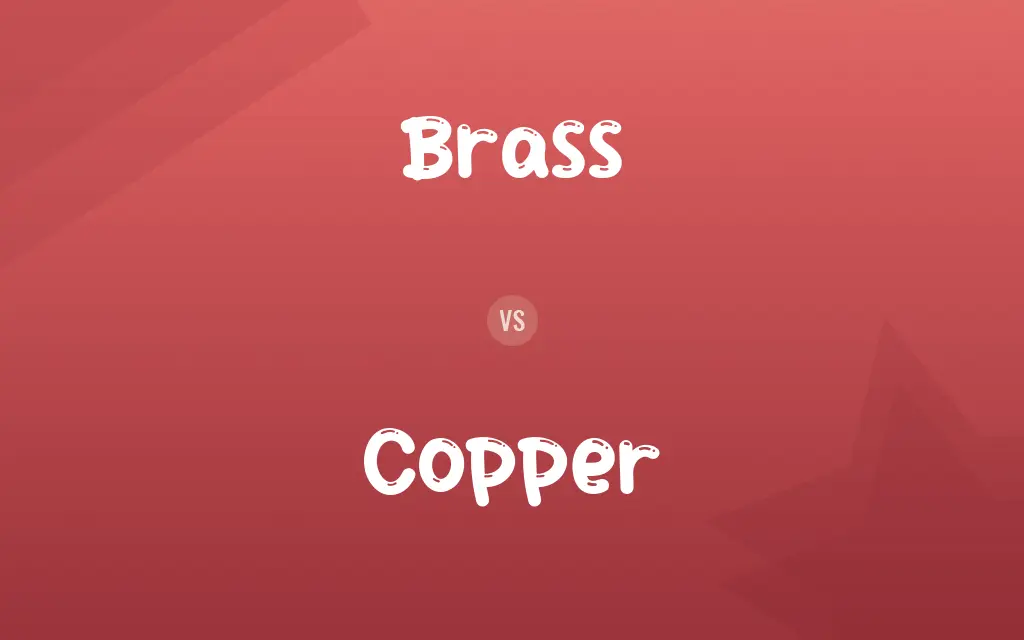Brass vs. Copper: Difference and Comparison
Edited by Muazma Batool — By Muneeza Rehman — Published on March 31, 2024
Brass is an alloy of copper and zinc, known for its malleability and resistance to corrosion, often used in decorative items and musical instruments. Copper is a pure element with high thermal and electrical conductivity, commonly used in electrical wirin

Difference Between Brass and Copper
Brass, being an alloy of copper and zinc, exhibits qualities that differ significantly from pure copper. The addition of zinc to copper enhances brass's strength, durability, and resistance to corrosion, making it highly suitable for applications requiring low friction, like locks, gears, and bearings. Copper, in contrast, is celebrated for its excellent thermal and electrical conductivity, making it indispensable in electrical wiring, electronics, and as a heat conductor in cooking utensils.
Muneeza Rehman
Mar 31, 2024
The color of brass can vary from red to yellow depending on the amount of zinc added, whereas copper is known for its distinctive reddish-brown hue. This variation in color makes brass more versatile for decorative purposes, allowing for a range of aesthetic choices in art and architecture. Copper, however, is often sought after for its natural beauty and antibacterial properties, used extensively in decorative arts and antimicrobial surfaces.
Muneeza Rehman
Mar 31, 2024
Brass is harder and more durable than pure copper, which is relatively soft and malleable. This makes brass more suitable for applications where wear resistance is crucial, whereas copper's malleability makes it ideal for applications where it must be bent and shaped, such as in plumbing and metalwork.
Muneeza Rehman
Mar 31, 2024
In terms of cost, brass, being an alloy, can vary in price depending on the copper and zinc market prices, but it is generally less expensive than pure copper. This cost-effectiveness, combined with its durability, makes brass a popular choice for musical instruments, fittings, and fixtures.
Henry
Mar 31, 2024
Both materials offer corrosion resistance, brass's resistance varies with its zinc content, making it suitable for marine environments. Copper, known for forming a green patina when exposed to the elements, offers long-lasting durability and protection against corrosion, making it a preferred choice for outdoor applications and architectural elements.
Elijah
Mar 31, 2024
Brass vs. Copper Comparison Chart
Conductivity
Lower electrical and thermal conductivity than copper
High thermal and electrical conductivity
Muneeza Rehman
Mar 31, 2024
Applications
Decorative items, musical instruments, gears
Electrical wiring, plumbing, cooking utensils
Elijah
Mar 31, 2024
Corrosion Resistance
Good, varies with zinc content
Excellent, develops a protective patina
Muneeza Rehman
Mar 31, 2024
Brass vs. Copper Definitions
◉Brass
Less expensive than copper, widely used in decorative arts.
Affordable brass fittings are commonly used in modern homes.
Kaitlyn
Feb 27, 2024
◉Copper
Features a distinctive reddish-brown color.
The copper roof aged to a beautiful green patina over time.
Muneeza Rehman
Feb 27, 2024
◉Brass
Known for its resistance to corrosion and malleability.
Brass door knobs are popular for their durability and aesthetic appeal.
Olivia
Feb 27, 2024
◉Copper
Celebrated for its thermal conductivity and antibacterial properties.
Copper cookware evenly distributes heat for perfect cooking.
William
Feb 27, 2024
◉Brass
Offers lower electrical conductivity than copper.
Brass is not preferred for electrical applications due to its lower conductivity.
Muneeza Rehman
Feb 27, 2024
◉Copper
A pure metallic element with high conductivity.
Copper wiring is essential for safe electrical installations.
Muneeza Rehman
Feb 27, 2024
◉Brass
An alloy of copper and zinc, used for its strength and acoustic properties.
The saxophone, made of brass, had a rich, vibrant sound.
Levi
Feb 27, 2024
◉Copper
More expensive than brass, used in high-quality applications.
High-end audio systems use copper cables for superior sound quality.
Muneeza Rehman
Feb 27, 2024
◉Brass
Varies in color based on zinc content.
The brass sculpture had a golden hue, showcasing its zinc mixture.
Muneeza Rehman
Feb 27, 2024
◉Copper
Soft and malleable, ideal for plumbing.
Copper pipes are favored in plumbing for their durability and flexibility.
Nolan
Feb 27, 2024
◉Brass
A yellowish alloy of copper and zinc, sometimes including small amounts of other metals, but usually 67 percent copper and 33 percent zinc.
Muneeza Rehman
Feb 27, 2024
◉Copper
Symbol Cu A ductile, malleable, reddish-brown metallic element that is an excellent conductor of heat and electricity and is widely used for electrical wiring, water piping, and corrosion-resistant parts, either pure or in alloys such as brass and bronze. Atomic number 29; atomic weight 63.546; melting point 1,085°C; boiling point 2,562°C; specific gravity 8.96; valence 1, 2. See Periodic Table.
Muneeza Rehman
Feb 27, 2024
◉Copper
A coin, usually of small denomination, made of copper or a copper alloy.
Muneeza Rehman
Feb 27, 2024
◉Brass
The section of a band or an orchestra composed of brass instruments.
Muneeza Rehman
Feb 27, 2024
Brass vs. Copper Frequently Asked Questions
Is brass or copper more expensive?
Copper is generally more expensive than brass due to its purity and high demand in electrical and thermal applications.
Kaitlyn
Mar 31, 2024
What makes brass different from copper?
Brass is an alloy of copper and zinc, making it harder and more corrosion-resistant, while copper is a pure element known for its conductivity.
Muneeza Rehman
Mar 31, 2024
Can brass be used for electrical applications?
While brass can conduct electricity, it is not as conductive as copper and is less commonly used in electrical applications.
Muneeza Rehman
Mar 31, 2024
Is brass suitable for outdoor use?
Brass is suitable for outdoor use, especially in marine environments, due to its corrosion resistance, though its zinc content should be considered for specific conditions.
Muneeza Rehman
Mar 31, 2024
Why is copper preferred for electrical wiring?
Copper's high electrical conductivity makes it ideal for efficient energy transfer in electrical wiring.
Muneeza Rehman
Mar 31, 2024
Can the color of brass vary?
Yes, the color of brass can range from red to yellow, depending on the zinc content.
Levi
Mar 31, 2024
Why does copper develop a green patina?
Copper develops a green patina when exposed to the elements, which acts as a protective layer against further corrosion.
Levi
Mar 31, 2024
How do the antibacterial properties of copper affect its use?
Copper's antibacterial properties make it ideal for use in medical environments and in applications where hygiene is a priority, such as in kitchen surfaces.
Jonathan
Mar 31, 2024
Why is brass popular in musical instruments?
Brass is valued in musical instruments for its acoustic properties, producing a rich, resonant sound, along with its durability and workability.
Olivia
Mar 31, 2024
Are there any applications where both brass and copper are used together?
Yes, in applications where both corrosion resistance and conductivity are needed, such as in certain types of valves and fittings, both brass and copper may be used to leverage their respective advantages.
Muneeza Rehman
Mar 31, 2024
Content Creators
Written by
Muneeza RehmanAt Comparisons.wiki, Muneeza skillfully navigates the vast sea of information, ensuring clarity and accuracy as the lead content editor. With a keen eye for detail, she curates every comparison to enlighten and engage readers.
Edited by
Muazma BatoolAs a content editor, Muazma Batool is not just a grammar guru but a creative mastermind who breathes life into every word. With an eagle eye for detail and a passion for storytelling, she transforms bland text into engaging content that captivates audiences and drives results.

































